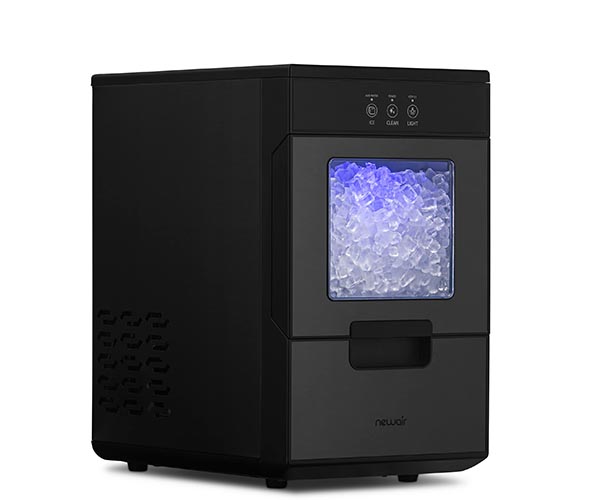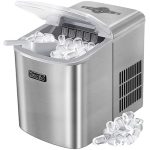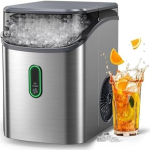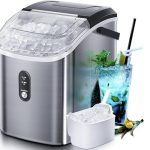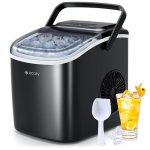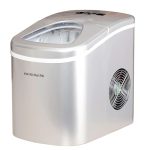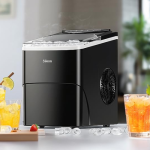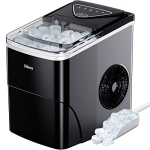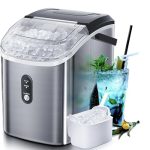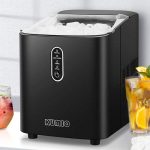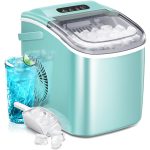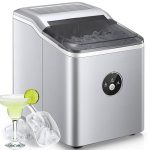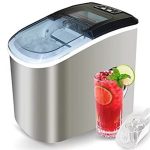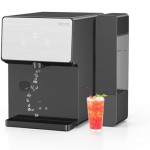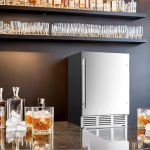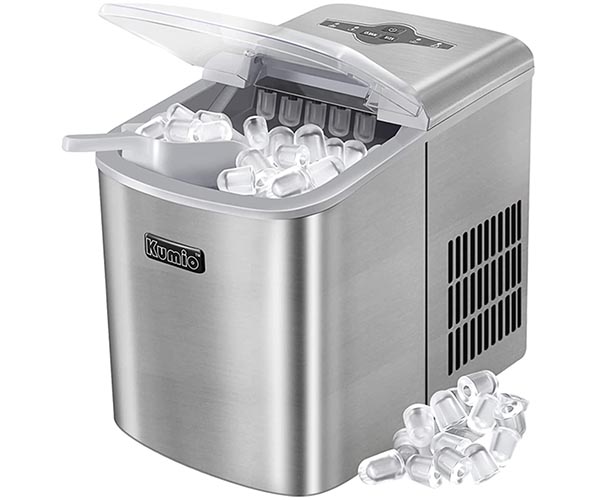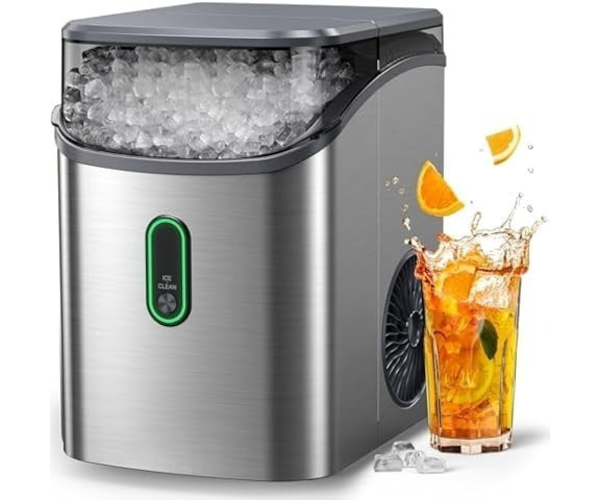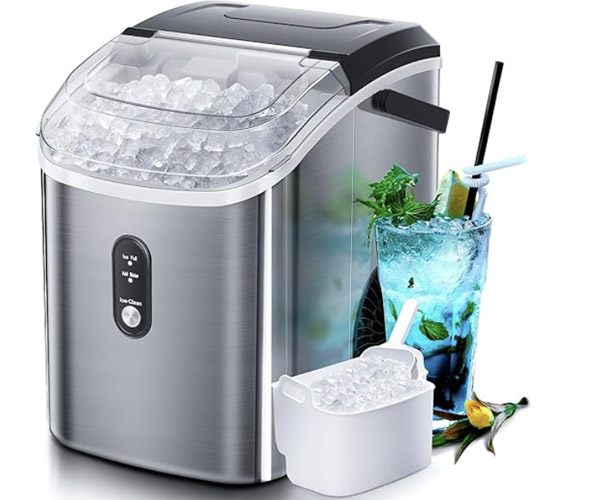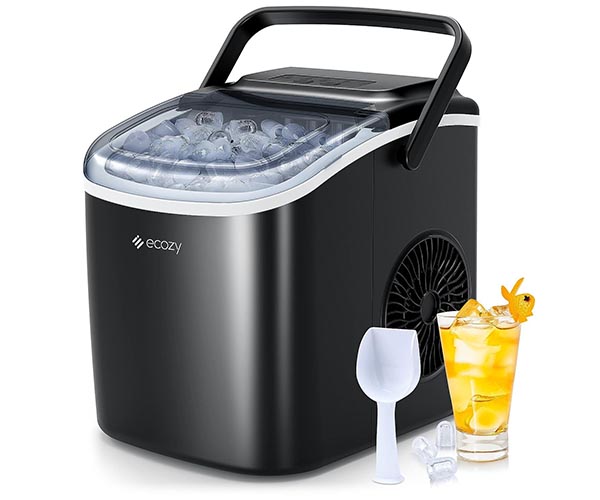Introduction
Maintaining the cleanliness of your countertop ice maker is not just a matter of efficiency; it’s a vital component of ensuring health and safety in your kitchen. When it comes to cleaning, choosing eco-friendly solutions is not only beneficial for your appliance but also for the environment and your well-being.
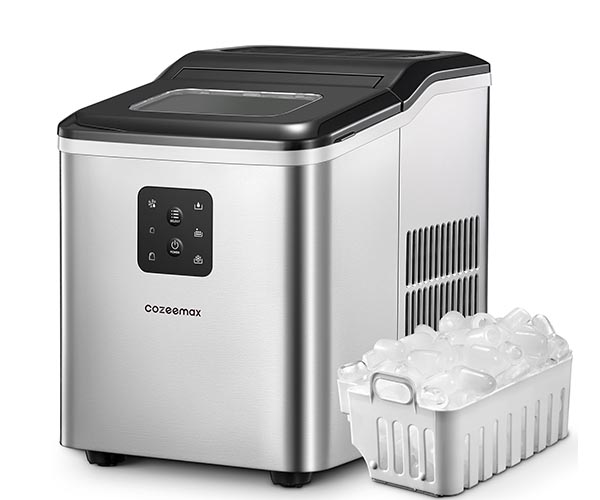
- Health Benefits:
- Prevent Bacteria and Mold Growth: Regular cleaning of your ice maker is crucial to prevent the build-up of bacteria and mold. These contaminants can negatively impact your health, potentially leading to foodborne illnesses.
- Enhance Appliance Efficiency: Keeping your ice maker clean ensures that it operates efficiently, reducing energy consumption and extending its lifespan.
- Eco-Friendly Cleaning Solutions:
- Sustainability: Using natural cleaning agents like vinegar, lemon, and baking soda minimizes harmful chemicals entering the environment, supporting a more sustainable lifestyle.
- Safety: Unlike harsh chemical cleaners that can leave toxic residues, eco-friendly solutions offer a safer alternative for your home, ensuring that the ice produced is safe to consume.
By integrating eco-friendly practices into your routine, you not only maintain the operational efficiency of your ice maker but also contribute positively to environmental conservation and ensure a safer, healthier home environment. https://amzn.to/3WoePQf
The Importance of Regular Cleaning
Understanding why regular cleaning is crucial for the lifespan and performance of your countertop ice maker is key to maintaining an efficient and long-lasting appliance. By incorporating the keyword “how often to clean countertop ice maker,” we can explore recommended cleaning frequencies and their significance.
- Lifespan of the Ice Maker:
- Prevents Build-up: Regular cleaning prevents the build-up of minerals and scale that can wear down the mechanical parts of your ice maker, potentially leading to costly repairs or replacements.
- Ensures Efficient Operation: Keeping your ice maker clean ensures that it operates at peak efficiency, which can help reduce energy consumption and maintain optimal performance.
- Performance of the Ice Maker:
- Quality of Ice: Regularly cleaning your ice maker ensures the ice produced is of high quality—clear, odor-free, and taste-free. This is particularly important in settings where the ice is directly consumed.
- Consistent Production: A clean ice maker is more likely to produce ice at a consistent rate and maintain the expected ice cube size and shape, enhancing user satisfaction.
- Recommended Cleaning Frequencies:
- General Recommendation: It is generally recommended to clean your countertop ice maker every three to six months, depending on the hardness of your water and the frequency of use.
- Adjust Based on Usage: If “how often to clean countertop ice maker” is a concern, consider adjusting the cleaning frequency based on how heavily the machine is used. Frequent usage or hard water supply may necessitate more frequent cleanings to maintain optimal performance and ice quality.
Regular cleaning not only extends the lifespan of your ice maker but also ensures it continues to perform well, producing high-quality ice and operating efficiently. This routine maintenance is an essential part of appliance care that should not be overlooked.
Eco-Friendly Cleaning Agents
Using eco-friendly cleaning agents not only supports environmental sustainability but also provides a safe and effective way to maintain your countertop ice maker. Here are three natural substances that can be used to clean and maintain your appliance:
- Vinegar and Water Solution:
- Effective Cleaning and Descaling: A mixture of vinegar and water is a highly effective natural cleaning solution for ice makers. The acetic acid in vinegar acts as a natural descaler, capable of breaking down lime scale and mineral build-up that can occur in areas with hard water.
- Simple Mixture: To use, mix equal parts of white vinegar and water. Apply this solution to the interior surfaces of the ice maker, let it sit for about an hour, then rinse thoroughly with water to prevent any vinegar taste in the ice.
- Baking Soda:
- Odor Removal: Baking soda is excellent for removing odors due to its natural deodorizing properties. It can absorb unpleasant smells that may develop from stagnant water or leftover residue.
- Cleaning Uses: To clean with baking soda, make a paste by mixing it with a small amount of water. Apply this paste to the interior surfaces of the ice maker, scrub gently with a soft brush or cloth, then rinse thoroughly to remove any residue.
- Lemon Juice:
- Natural Acidic Cleaner: Lemon juice contains citric acid, which makes it effective at removing hard water stains and freshening up your ice maker. Its natural acidity helps break down scale and mineral deposits.
- Usage: Squeeze the juice of a lemon and mix it with an equal amount of water. Use this mixture to wipe down the internal components of the ice maker. The lemon not only cleans but also leaves a fresh, clean scent.
By incorporating these eco-friendly cleaning agents into your maintenance routine, you ensure that your ice maker is not only clean but also operating efficiently and free of harmful chemicals. Plus, these natural cleaners are safe for the environment and your health, making them ideal choices for conscientious homeowners. https://amzn.to/3WoePQf
Step-by-Step Guide to Cleaning with Eco-Friendly Products
Maintaining your countertop ice maker with eco-friendly products is not only simple but highly effective. Here’s a detailed guide on how to utilize the mentioned eco-friendly cleaners, including their proportions, application methods, and recommended cleaning intervals. We’ll also highlight how these solutions maintain the cleanliness and functionality of your ice makers.
- Vinegar and Water Solution:
- Proportions: Mix equal parts of white vinegar and water.
- Application Method: Pour the mixture directly into the water reservoir of the ice maker. Run the ice maker for a few cycles to ensure the solution circulates through the system. Then, let it sit for an hour before running several cycles with plain water to rinse the system thoroughly.
- Cleaning Interval: Use this solution every three to six months, or more frequently if you notice scale buildup or if the ice maker is used heavily.
- Baking Soda:
- Proportions: Create a paste with one part water to three parts baking soda.
- Application Method: Apply the paste directly to the interior surfaces and components of the ice maker, especially in areas with visible residue. Use a soft brush or cloth to scrub gently. Rinse thoroughly with clean water to remove all baking soda residue.
- Cleaning Interval: Baking soda can be used as needed for odor control or when you notice residues that are difficult to remove with regular cleaning.
- Lemon Juice:
- Proportions: Mix the juice of one lemon with an equal amount of water.
- Application Method: Use a soft cloth or sponge to apply the lemon juice mixture to the interior surfaces of the ice maker. Allow the mixture to sit for about 30 minutes before rinsing thoroughly with clean water.
- Cleaning Interval: Lemon juice cleaning can be done every three to six months or whenever you notice hard water stains or want to freshen up the machine.
Effectiveness of Eco-Friendly Cleaning Solutions:
- Safe and Effective: These natural cleaners effectively remove mineral deposits, odors, and residues without the use of harsh chemicals, ensuring your ice remains safe to consume.
- Maintains Functionality: Regular use of these eco-friendly cleaning methods helps to keep your ice maker functioning efficiently, preventing common problems associated with buildup and residue.
- Environmental Impact: By choosing eco-friendly products, you’re not only maintaining your appliance but also contributing to a healthier environment by reducing chemical runoff and exposure.
Adhering to this cleaning guide will help ensure that your ice maker remains clean, efficient, and operational, extending its lifespan and improving the quality of ice it produces. Remember, regular maintenance using these eco-friendly products is key to achieving optimal results.
Comparing Chemical vs. Eco-Friendly Cleaners
When it comes to cleaning your countertop ice maker, the choice between conventional chemical cleaners and eco-friendly alternatives can significantly impact both the environment and your health. Here we discuss the key differences between these options and explain why eco-friendly solutions are often the preferable choice for households aiming to reduce their ecological footprint.
- Impact on the Environment:
- Chemical Cleaners: These cleaners often contain harsh substances like chlorine and ammonia, which can cause significant environmental damage. When rinsed away, these chemicals can contribute to water pollution, adversely affecting aquatic life and potentially entering the human water supply.
- Eco-Friendly Cleaners: Solutions like vinegar, baking soda, and lemon juice are biodegradable and much less harmful to the environment. They break down naturally and do not emit hazardous chemicals into waterways or soil.
- Impact on Health:
- Chemical Cleaners: The use of strong chemical cleaners can pose health risks, including respiratory problems, skin irritation, and other serious health issues if inhaled or if they come into contact with the skin. Moreover, residues from these cleaners can taint the ice produced, potentially affecting consumption safety.
- Eco-Friendly Cleaners: Natural cleaners are generally safer for use around humans and pets. They do not release harmful fumes and are less likely to cause skin or respiratory irritation. This makes them a safer choice for homes, especially for families with children, elderly residents, or those with health sensitivities.
- Why Eco-Friendly Solutions Are Preferable:
- Sustainability: Eco-friendly cleaning methods underscore a commitment to sustainable living by minimizing environmental impact and reducing exposure to toxic chemicals.
- Effectiveness: Despite being gentle on the environment and health, eco-friendly cleaners are highly effective at maintaining the cleanliness and functionality of ice makers. They manage to descale, deodorize, and clean efficiently without the risks associated with chemical products.
- Cost-Effectiveness: Often, eco-friendly solutions can be cheaper in the long run. Ingredients like vinegar and baking soda are inexpensive and versatile, capable of handling multiple cleaning tasks around the home beyond just the ice maker.
Given these differences, it is clear why eco-friendly cleaners are often the preferred choice for households looking to decrease their ecological footprint while maintaining a safe and clean home environment. Choosing these alternatives not only benefits the planet but also ensures a healthier living space, aligning with more sustainable, health-conscious lifestyle goals.
Tips for Maintaining an Ice Maker Using Eco-Friendly Practices
Ensuring the longevity and efficiency of your countertop ice maker doesn’t require harsh chemicals. Adopting eco-friendly practices can be equally effective and far more sustainable. Here are some routine practices and natural tips to help you maintain your ice maker while being mindful of the environment.
- Routine Cleaning with Natural Substances:
- Regular Vinegar Cleanses: Incorporate a monthly vinegar rinse into your maintenance schedule. Vinegar is excellent for descaling and naturally disinfecting without the use of harsh chemicals.
- Baking Soda Scrubs: Use baking soda to clean interior surfaces every few months or as needed to neutralize odors and absorb any lingering moisture that could foster mold growth.
- Preventing Mold and Scale Build-Up:
- Keep the Unit Dry: Always ensure that the interior of your ice maker is dry when not in use. Wipe down the interior with a dry cloth after cleaning to remove any moisture.
- Use Filtered Water: Reduce scale build-up by using filtered water in your ice maker. This helps minimize the concentration of minerals that lead to scaling and residue.
- Air Circulation: Keep the area around your ice maker well-ventilated to discourage mold growth. Mold thrives in stagnant, moist environments, so improving airflow can significantly reduce its occurrence.
- Lemon Rinse for Freshness: Implement a quarterly lemon rinse. The natural citric acid in lemon not only helps in breaking down scale but also leaves a fresh scent and has natural antibacterial properties.
- Regular Inspection and Maintenance:
- Check Seals and Filters Regularly: Inspect the seals around your ice maker and replace any that are worn out to keep the unit airtight and free from external contaminants.
- Decalcify with Eco-Friendly Products: If your area has hard water, consider a more frequent decalcification routine using a mixture of lemon juice and water.
- Scheduled Deep Cleans: Even with regular maintenance, schedule a thorough clean every six months to address any areas that are difficult to reach in your routine cleaning.
By following these tips, you can maintain your ice maker in a way that is both effective and eco-friendly. These practices not only extend the life of your appliance but also ensure it operates efficiently and remains a healthy source of ice for everyday use. https://amzn.to/3WoePQf
FAQs about What are eco-friendly cleaning solutions for countertop ice makers?
- How often should I clean my countertop ice maker?
- You should clean your countertop ice maker every three to six months to ensure optimal performance and hygiene. If your water supply is hard or the ice maker is used frequently, consider increasing the cleaning frequency.
- What is the best eco-friendly cleaner for an ice maker?
- A mixture of equal parts white vinegar and water is an excellent eco-friendly cleaner for ice makers. This solution effectively removes mineral deposits and can be used to sanitize the interior components of the machine.
- Can baking soda be used to clean an ice maker?
- Yes, baking soda is great for cleaning ice makers. It helps remove odors and can be used to clean the interior surfaces. Create a paste with water, apply it inside the ice maker, scrub gently, and rinse thoroughly.
- How do I prevent mold in my ice maker?
- To prevent mold, ensure the ice maker is dry and clean after each use. Regularly clean with a vinegar solution, leave the lid open to air dry after cleaning, and maintain good air circulation around the machine.
- What natural method can remove hard water stains from an ice maker?
- Lemon juice is effective in removing hard water stains due to its natural acidic properties. Apply a mixture of lemon juice and water to the affected areas, let it sit for a few minutes, then wipe and rinse thoroughly.
- Is it safe to use vinegar to clean an ice maker that makes ice for consumption?
- Yes, it is safe to use vinegar in an ice maker. After cleaning with vinegar, ensure to run several cycles with plain water and discard this ice to ensure no vinegar residue remains that could affect the taste of your ice.
Conclusion
In concluding our guide on maintaining countertop ice makers with eco-friendly solutions, it’s crucial to underscore the benefits these methods bring not only to your appliances but also to the environment. By embracing these practices, you contribute positively towards a more sustainable and responsible way of living.
- Benefits of Using Eco-Friendly Cleaning Solutions:
- Enhanced Appliance Health: Using natural cleaning agents like vinegar, lemon, and baking soda ensures that your ice maker remains free from harsh chemical residues that can degrade its components over time.
- Safety: Eco-friendly cleaning solutions are safer for your health as they do not release any toxic chemicals into your home environment, making your ice safer to consume.
- Cost-Effective: Most eco-friendly cleaners are inexpensive and readily available household items, which can reduce the overall cost of maintaining your ice maker.
- Reinforcing Environmental Responsibility and Appliance Care:
- Sustainable Practices: By choosing natural cleaners, you reduce the chemical load on our water systems and contribute to a healthier ecosystem.
- Long-Term Appliance Efficiency: Regular use of these gentle yet effective cleaning methods can prolong the life of your ice maker, ensuring it operates at peak efficiency for years to come.
- Community Impact: Encourage others by sharing your experiences and the benefits of using eco-friendly cleaning methods. Inspiring others to adopt these practices can have a ripple effect, enhancing the collective impact on our environment.
By adopting eco-friendly cleaning solutions, you do more than just clean an appliance—you participate in a movement towards sustainability and responsible living. Let’s continue to care for our appliances and our planet with equal respect and diligence.
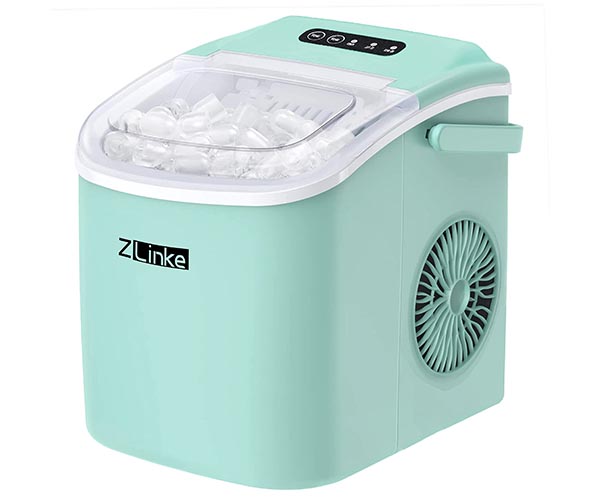
Call to Action
Now that you’re equipped with knowledge on eco-friendly cleaning methods for your countertop ice maker, we encourage you to put these practices into action. Not only will you be taking steps to maintain your appliance efficiently, but you will also be contributing positively to environmental conservation.
- Try Eco-Friendly Cleaning Methods:
- Experience the Benefits: We invite you to try out these natural cleaning solutions. Whether it’s using vinegar, baking soda, or lemon juice, observe how effectively they maintain the cleanliness of your ice maker while being gentle on the planet.
- Share Your Experiences: After you’ve tried these methods, please come back and comment on this post. Your feedback can help others understand the practical benefits and any tips or tweaks you discovered.
- Spread the Word:
- Educate and Inspire: If you find these eco-friendly cleaning methods beneficial, don’t keep it to yourself! Share this post with friends, family, and on social media to inspire others to adopt sustainable practices in their homes.
- Build a Community: By sharing, you help build a community that supports sustainable living. The more people adopt these practices, the greater the impact we can have on reducing harmful chemicals in our environment.
Embracing and sharing eco-friendly cleaning practices is more than a personal choice—it’s a community effort towards a healthier planet. Let’s lead by example, showing that every small step can make a significant difference. Try these methods, share your story, and encourage others to join in the movement towards sustainability. https://amzn.to/3WoePQf
References
- GE Profile Opal Nugget Ice Maker Product Page
- NewAir Countertop Ice Maker Product Page
- Igloo ICEB26HNBK Portable Electric Countertop Ice Maker Product Page
- Scotsman SCN60PA-1SS
- EUHOMY Nugget Ice Maker Countertop
- Silonn Ice Maker Countertop
Additional Resources
- [How often should you clean your countertop ice maker?]
- [What happens if you don’t clean your countertop ice maker regularly?]
- [How does a countertop ice maker work?]
- [How to install a countertop ice maker?]
- [How often to descale a countertop ice maker?]
- [Buying Guide: Countertop Ice Makers with Water Line Connection]
- [Kitchen Upgrade Ideas: Countertop Ice Makers with Water Line]
- [Which countertop ice maker with freezer is best?]

